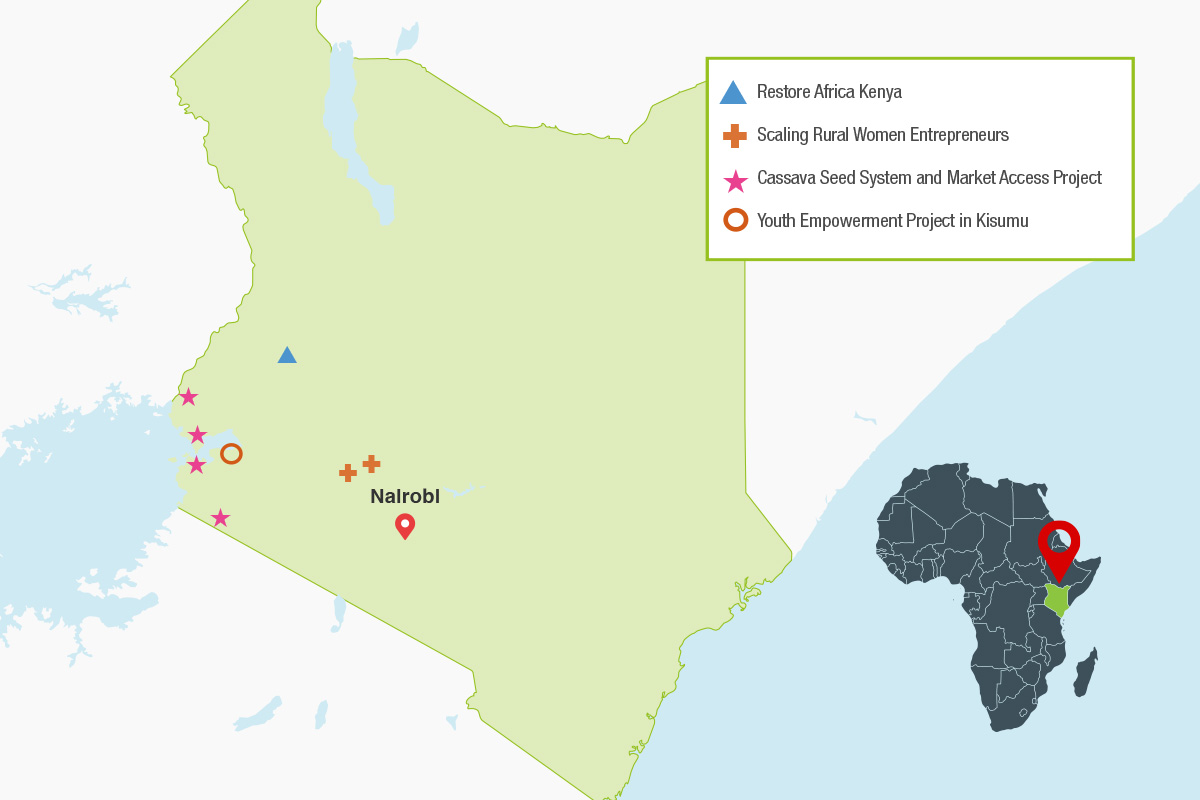our work
in kenya
Supporting smallholder farmers to move from subsistence to prosperity, and working on building resilience to climate change, is at the core of our programme work in Kenya.
Self Help Africa in Kenya works with smallholder farmers to move them from subsistence to commercialisation through a range of projects - from
supporting those in extreme poverty, to assisting enterprise development and business partnerships, and through expanding research in dairy production.
SHA works with smallholder farmers, farmer groups and associations across the country, including in the arid and semi-arid areas to address food security and nutrition challenges, and link farmers to markets through farming as a business approach.
Full Name: Republic of Kenya
Population: 53.01 million (2021)
Capital: Nairobi
Area: 582,646 km²
Major Languages: Swahili, English
Major Religions: Christianity, Islam, Baháʼí, Buddhism, Hinduism and traditional religions
Kenya projects
Restore Africa Kenya: Restoring landscapes and livelihoods in East and Southern Africa
Elgeyo Marakwet County (SHA), Narok County, Tana River County, and Kwale County
Objective: The programme will support climate-vulnerable communities targeting men, women, and youth including people with disabilities in 250,000 households in Elgeyo Marakwet, Narok, Kwale, Tana River counties in Kenya to improve sustainability and resilience to the ecosystem goods and services and increase household resilience and adaptive capacity.
The Programme goal is Resilient and productive socio-ecological systems by 2052 through landscape restoration, livelihoods building for 250,000 smallholder farmers and pastoralists (men, women and youth) covering 250,000 hectares of land in four target Counties in Kenya. This programme will help build substantial carbon sinks and sequestration opportunities, allowing viable returns to both small-holder farmers and investors. The programme will seek to achieve this through 1) Increased resilience and diversified livelihoods for small-holder households; 2) Improved sustainable income for communities from resilient climate smart value chains; 3) Diversified and sustainable income streams through carbon market engagements; and 4) Strengthened institutional, knowledge sharing and regulatory systems/framework (policies) for climate-responsive planning/development and carbon trading.
- 250,000 households
Scaling Rural Women Entrepreneurs for Community-Led Digital Adaptation & Resilience in Africa (RWE-Africa)
Nakuru County
Communities are leading their own improvement of nutrition and wellbeing
RWE-Africa combines the lessons learned in Bangladesh with insights and co-creation involving a variety of stakeholders via the digilab Scaling Lab Sprint. This is a 3-country project being implemented in Kenya, Malawi and Nigeria. The overall goal of the proposed pilot is to build the adaptive capacity and resilience of rural communities in Kenya, Nigeria, and Malawi to the food and climate crises using the women-led social enterprise model to facilitate digital skill building and service delivery.
- Kenya only: 10,000 (40% women) accessing nutrition information and services through digital solutions
Cassava Market Access Project (CaMaP)
Kisumu, Migori, Homabay, & Busia Counties
The project’s objective is to increase incomes and reduce poverty for 8,000 cassava smallholder farmers by promoting efficient and well-functioning seed systems and markets
The Cassava Market Access Project is an upscaling initiative from Strengthening the Competitiveness of Cassava Value Chain Project in Kenya funded by the European Union. The project will cover Busia, Homabay, Kisumu, and Migori counties in Kenya. The project’s objective is to increase incomes and reduce poverty for 8,000 cassava smallholder farmers by promoting efficient and well-functioning seed systems and markets.
- 8,000 (6,000 Female | 2,000 Male | 1,000 Youth)
Youth Empowerment Project in Kisumu
Kisumu
Objective: Increased access to employment/ self-employment opportunities for 200 youths in Kisumu County
The overall aim of this project is to support the 30 youths from the phase one of the DG project to further their skills and training to the next level of the apprenticeship through formal training, on-the-job coaching and mentorship, and support 200 youths engage in income generating ventures.
- 200 youths
Baringo Resilience Initiative: Nurturing Greater Opportunity
Baringo
Objective: To promote secure and sustainable livelihoods amongst individual households that are prone to drought in Baringo County by enabling them to spread their risk and prevent production asset loss thereby increasing their income. The pathway to change is premised on mitigating the effect of climate change and building community resilience.
Strategies to mitigate the effect of climate change and building community resilience focus on:
- Increasing agricultural productivity through provision of widely-accessible inputs and extension services to increase crops and livestock production;
- Increasing household nutrition
- Improving land use to ensure better utilization of high and medium potential lands through water and soil conservation techniques;
- Increasing markets and market access for agricultural produce
10,000 households.
TO CONTACT US ABOUT OUR WORK IN kenya:
P.O. Box 14204 (00800)
Nairobi
Tel. +254 703 946477
E-mail: [email protected]

